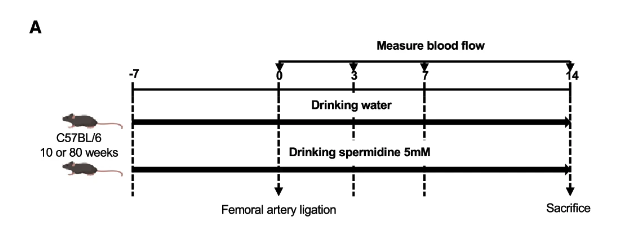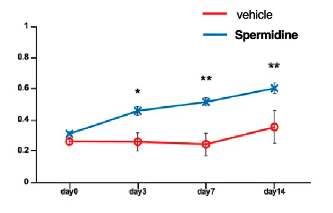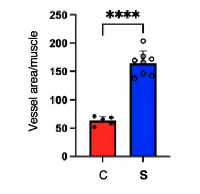A recent study evaluated the therapeutic efficacy of Spermidine for blood flow recovery and blood vessel growth after artificially blocked blood flow in mice.
“Spermidine is a naturally occurring polyamine that has shown substantial evidence of anti-aging properties”
Key Points:
The study uncovered several benefits of Spermidine supplementation:
- Spermidine helped restore blood flow in limbs that have been damaged by a lack of blood flow
- Spermidine helped create new blood vessels in areas of reduced blood flow
- The benefits of Spermidine supplementation were particularly robust in aged mice
The Effect of Spermidine Supplementation After Blood Flow Disruption was Evaluated in Young and Aged Mice.
The researchers used two groups of mice: young (10 weeks old) and aged (80 weeks old).
These mice were used to study a condition called hind-limb ischemia, which means reduced blood flow to one of the hind limbs. To create this condition, the researchers performed surgery to block the blood flow to one of the hind limbs of each mouse.
The mice were either given drinking water supplemented with Spermidine (5 mM) or standard drinking water (control group) for 14 days after blood flow blockage.

Spermidine Enhanced Blood Flow Recovery in Areas with Blood Flow Blockage
Spermidine significantly increased blood flow in limbs of aged mice with limited blood supply.

The older mice supplemented with Spermidine (represented by the blue line) had increased blood flow on days 3, 7, and 14 after experimentally-induced blood flow blockage compared to older mice that were not given Spermidine (represented by the red line).
Spermidine Increased the Growth of New Blood Vessels in the Hind Limb of Mice After Blood Flow Disruption

After 14 days of Spermidine supplementation, the muscle with restricted blood flow in aged mice showed a higher number of blood vessels (represented by the blue bar) compared to aged mice that did not receive Spermidine (represented by the red bar).
The Benefits of Spermidine Were Especially Pronounced in Aged Mice
Aged mice experienced significantly more damage from the blood flow blockage than young mice. However, they also benefited more from Spermidine supplementation.
“Of note, dietary spermidine significantly enhanced ischemia‐induced angiogenesis, and improved the blood flow recovery in the ischemic limb, especially in aged mice”
Angiogenesis is the process of forming new blood vessels, and it plays a crucial role during ischemia, which is a condition characterized by inadequate blood supply to tissues.
Conclusion
Spermidine helped improve blood flow and promote the growth of new blood vessels in mice with reduced blood flow. The benefits of Spermidine supplementation are particularly pronounced in aged mice. These findings highlight Spermidine’s potential as a therapeutic option for ischemic conditions, which are diseases caused by a lack of blood flow.
“Our results reveal novel proangiogenic functions of spermidine, suggesting its therapeutic potential against ischemic disease.”
